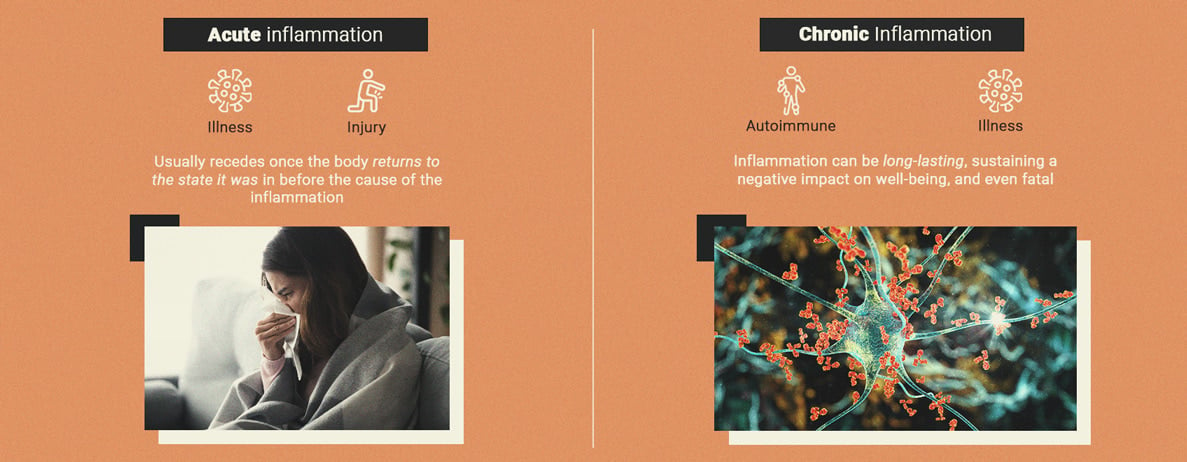.

Cannabis and Inflammation: What's the Relationship?
From stubbing your toe through to cancer, inflammation is the body's response to just about any physical issue. In most cases, it is a healthy response that keeps us alive. Sometimes, though, inflammation and the immune system can become dysfunctional, leading to dangerous complications and extreme pain. So, does cannabis impact inflammation?
Contents:
Inflammation and inflammation-related diseases can be deeply debilitating and incredibly painful. While effective medicines do exist for them, the more powerful ones tend to exhibit bad side effects when used over long periods. Therefore, there is a need for safe and effective treatments that could be used for chronic, or even lifelong, conditions.
Here we investigate the potential relationship between cannabis—specifically THC and CBD—the endocannabinoid system, and inflammation and autoimmune disorders.
What Is Inflammation?
Put simply, inflammation is the immune system's way of protecting against and fighting infection. When you injure yourself, the area will become red and swollen. This is the result of blood rushing to the area, bearing an army of white blood cells. These immune cells surround the injury and tackle any form of infection that may appear.
Internally, this process may also happen around organs or even in blood vessels. Essentially, anywhere the body thinks it might be at risk will become inflamed.
Due to the amount of drugs marketed as anti-inflammatory, and the general discourse surrounding inflammation, you might believe inflammation to be a bad thing. In fact, inflammation is generally a good thing, providing you with protection from disease. Sometimes, though, inflammation can become pathological.


What Types of Inflammation Are There?
Inflammation is divided into two broad categories: acute and chronic.
Generally, acute inflammation occurs as the consequence of an illness or injury. It can be slight to severe, lasting from a day to a few weeks. Usually, it recedes once the body returns to the state it was in before the cause of the inflammation.
Sometimes, due to ongoing illness or autoimmune dysfunction, inflammation can be long-lasting, sustaining a negative impact on well-being, and even fatal. In these cases, it is known as chronic inflammation—which comes with a whole host of other negative health effects.
-
Autoimmune Diseases
Autoimmune diseases are those in which the body’s immune system mistakenly attacks parts of the body that are not infected. This can cause chronic inflammation, and can be incredibly dangerous and debilitating.


What Are the Symptoms of Inflammation?
The symptoms and complications of chronic inflammation are broad and complex. In terms of acute inflammation, there are some common symptoms, many of which are localised to a certain area.
Symptoms of acute inflammation include:
|
|
|
Symptoms of chronic inflammation include:
Is Inflammation Dangerous?
In most day-to-day cases, inflammation is beneficial and nothing to be concerned about. However, chronic inflammation can become dangerous. In these cases, it may be necessary to take medication to modulate the inflammation and return your body to a more balanced, healthy state.
What Treatments Are Available for Inflammation?
There are many treatments for inflammation. Some can be purchased over the counter, whereas others require a prescription from a doctor.
Medicines That Treat Inflammation: NSAIDs and Steroids
Medicines that treat inflammation autumn into two categories: nonsteroidal anti-inflammatory drugs (NSAIDs) and steroids.
-
Effects and Side Effects of NSAIDs
For mild, acute inflammation, there are effective medicines you can pick up easily. The most readily available anti-inflammatory medicines autumn into the NSAIDs category, the most famous of these being ibuprofen. This drug is found on the World Health Organisation’s list of essential drugs. Used for the treatment of a wide range of conditions, ibuprofen (and NSAIDs in general) are some of the most commonly prescribed and used drugs in the world.
Though considered very safe, they are associated with some side effects:
|
Though these side effects are severe, they are extremely uncommon when taken in the suggested manner; on the whole, these drugs are very safe.
-
Effects and Side Effects of Steroids
Steroids, or corticosteroids, are powerful drugs that can massively reduce inflammation. They mimic the hormone cortisol, which is naturally produced in the adrenal gland. On the whole, they require a prescription and tend to be used for severe or chronic inflammation.
You will not be prescribed steroids for a headache or a sore cut, but you might be for long-term inflammation or to treat autoimmune diseases. Interestingly, steroids also reduce immune function as well as fighting inflammation, which makes them doubly useful for the treatment of autoimmune disease and inflammation.
Like NSAIDs, steroids are generally considered safe. However, their use must be controlled and shouldn’t go on for too long.
The side effects can be:
Due to increased levels of artificially introduced cortisol, in the long term the body can stop producing its own supply if steroids continue to be taken. This can be extremely damaging and comes with a host of varied and severe side effects, including:
|
|
|
|
Natural Foods That May Reduce Inflammation
Foods cause the growth of colonies of different bacteria in the gut, which can affect inflammation throughout the body. Some, such as carbohydrates, are thought to increase inflammation, whereas others, e.g. the following, are thought to suppress it:
| Fruit and vegetables | Nuts and seeds | Coffee, cocoa, and green tea |
| Fruit and vegetables | Nuts and seeds | ||||||
| Coffee, cocoa, and green tea | |||||||
|---|---|---|---|---|---|---|---|


In these foods, it is thought to be the polyphenols and antioxidants that cause the proposed anti-inflammatory effects. Indeed, eating a healthy diet is one of the best ways to maintain good health.
Does Cannabis Affect Inflammation?
Cannabis and its constituent cannabinoids are being researched for their impact on inflammation in the human body. Research is ongoing, and we are yet to fully understand this relationship. What we do know, however, is that inflammation is related to the endocannabinoid system (ECS).
What Is the ECS and How Does It Relate to Inflammation?
The ECS is a network of receptors, signalling molecules (endocannabinoids), and enzymes found throughout the body. The two main receptor types, CB1 and CB2, are found primarily throughout the central nervous system and immune system, respectively, among other locations.
These receptors respond to endocannabinoids produced by the body—namely anandamide (AEA) and 2-arachidonoylglycerol (2-AG). In fact, inflammation is one of the triggers that causes the release of endocannabinoids[1].
However, the relationship is more complex than this. The two main endocannabinoids mentioned above are not the only compounds that exert an effect. N-arachidonoyl glycine (NAGly), which derives from anandamide, affects the orphan G protein-coupled receptor GPR18.
It has been shown that stimulation of GPR18 with NAGly stimulates macrophage cytosis[2]—the process by which the body’s immune cells ingest and destroy foreign cells. It also speeds up resolution, thereby potentially reducing inflammation.
This research shows that there is much we don’t know about inflammation itself, as it is unclear whether this is the process whereby natural inflammation comes to an end or not.
The Link Between the ECS and Inflammatory Conditions
The full scope of the ECS’ role in inflammation is an area of biology that is poorly understood, and so it would be irresponsible to make definitive claims about it here. But we can discuss what we do know.
Immune cells, of all the body’s cells, have the highest concentration of CB2 receptors. It is therefore speculated that these receptors play some role in modulating immune cell response and behaviour. In other words, they may be essential in controlling the body’s overall immune response[3]—including inflammation.
Exactly what implications this may have is up for debate, but it is possible that harnessing and controlling this process could open the door to new treatments for a wide range of chronic inflammation and autoimmune disorders.
Indeed, low levels of circulating endocannabinoids have even been linked to various inflammation-related conditions, including migraine and IBS[4]. And these are just a couple of the conditions researchers are connecting to this theory of “clinical endocannabinoid deficiency”.
To understand just how varied and wide-ranging inflammation-related illnesses can be, consider the list below:
Despite their differences, in all of these conditions, the immune system kicks in and causes inflammation in a certain part of the body, which inherently involves the ECS to some degree. Now, it needs to be reiterated that this is not always a bad thing, and we should not seek to suppress the immune system to the point that it does not function—that would quickly be fatal. However, there are many instances in which we would do well to modulate it.
Do Cannabinoids From Cannabis Impact Inflammation?
As of yet, research is not comprehensive enough to draw any definitive conclusions about the impact of cannabis-derived cannabinoids on inflammation. Nevertheless, what research does exist attempts to elucidate a multifaceted relationship between the cannabis plant and the immune system at large.
There are over 100 cannabinoids found in cannabis plants, and we know very little about most of them. So today we’ll talk about the two most famous: THC and CBD. It’s important, though, that we seek to understand more about the other compounds in the plant, as these might open up new research avenues.
THC
THC is the most abundant cannabinoid found in most cannabis plants (excluding hemp). It is also the one responsible for the high. An agonist of CB1 receptors, it is thought to work by mimicking anandamide—though it is more potent and less easy to break down.
THC has been studied for its impact on cell apoptosis in mice[5]. Apoptosis is the process whereby the body tells dysfunctional cells to commit cell-suicide. This process stops them from reproducing. For instance, cancer involves the reproduction of faulty cells, which under healthy circumstances would be killed off by the process of apoptosis.
Both THC and CBD have been investigated for their effect on lymphocyte proliferation and inflammatory cytokine production[6]. Both of these processes impact inflammation, hence the need for viable methods of modulation. For instance, among those who live with HIV, even when it is successfully controlled with drugs, they still have to deal with the effects of chronic inflammation caused by having an autoimmune disease.
CBD
In patients with multiple sclerosis (MS), anandamide levels are particularly high. Though unknown, it is suspected that this could be the body’s way of trying to reduce neuroinflammation. It was also found that in murine studies, mice that had their CB1 receptors (those that anandamide most readily binds to) knocked out exhibited significantly greater inflammation than those with functioning CB1 receptors[7]. This indicates that activation of CB1 receptors plays a role in the modulation of inflammation.
CBD interacts with the body partially by inhibiting FAAH[8], a fatty acid responsible for the breakdown of anandamide. Usually, anandamide is broken down rapidly, limiting its potency. By inhibiting FAAH, it may be possible to eke greater effects from our natural supply of anandamide. Exactly if and how this would work is not yet known, but it opens the door to focused investigation.
Research has also observed the effects of CBD and other non-psychotropic cannabinoids on the production of the monocyte chemotactic protein-2 (MCP-2)[9], a cytokine involved in inflammation, via the CB2 receptor.
CBD is somewhat advantageous over THC as a research target as it is non-psychotropic, meaning it doesn't cause a high. In fact, the World Health Organisation identified it as generally safe and having little risk of abuse[10].


Inflammation and Pain
Alongside other symptoms, one of the most intrusive and debilitating symptoms of chronic inflammation is pain. Eczema and skin conditions can cause incessant itching and pain; rheumatoid arthritis reduces mobility and can be excruciating; bowel issues such as Crohn’s can cause extreme discomfort… the list goes on.
Whether the inflammation is the consequence of another condition, such as cancer, or the condition in itself (as when one has a dysfunctional immune system), controlling inflammation is key to reducing pain in those suffering from it.
Chronic conditions are not the only worthy targets. Indeed, while acute inflammation tends to be less problematic and a healthy response to an issue, this is not always the case. Menstrual cramps, migraines, and post-exercise muscle pain are all examples of acute inflammation that can cause pain worthy of treatment.
These are just some of the inflammation-related conditions that can cause moderate to severe pain in those who suffer. With that in mind, discovering effective treatments without serious side effects could improve the lives of many.
Given the influence of the ECS in many of the processes underlying the above-mentioned conditions, researchers are eager to see if and how its modulation could potentially ease the pain experienced by patients.
How Can You Take Cannabis?
There are many ways to take cannabis. However, in most cases the FDA has not approved cannabis products as treatments for certain ailments.
Regardless, the most popular methods of taking cannabis are as follows:
| Smoking or vaping | Oral (edibles, capsules) | Topical creams | Sublingual oils (the most popular method of CBD intake) |
| Smoking or vaping | Oral (edibles, capsules) |
| Topical creams | Sublingual oils (the most popular method of CBD intake) |
Each of these methods comes with pros and cons regarding how long they last and how bioavailable they are. Moreover, it’s worth investigating the unique nature of each product you are considering. For instance, if you are buying a legal CBD product, what else does it contain?
Some products are made with CBD isolates, whereas others are broad or full-spectrum extracts, meaning they contain other cannabinoids and terpenes from the cannabis plant. Though not entirely understood, full-spectrum products are thought to benefit from the entourage effect, which is basically the holistic interaction of all the different compounds working in harmony.
The Legality of Cannabis and Cannabinoids
Cannabis legality varies from country to country, and even state to state is the US. Before forging ahead and introducing cannabis products into your life, make sure you know the legal status of cannabis and certain cannabinoids in your country.
Though cannabis is illegal in much of the world, CBD tends to be legal. Products such as CBD oils are often deemed legal if they contain less than 0.2% (EU) or 0.3% (US) THC. Other cannabinoids tend not to be controlled substances. It is important to note that even though the EU has set the limit at 0.2%, this varies across European countries, so always do your due diligence before taking a product across a border.
Even though CBD is widely legal, that’s not to say it's always advised. For instance, the FDA actively advises against pregnant and breastfeeding women using CBD in any form, as it’s just not clear what effect it might have on the development of a baby.
Likewise, just because a product is legal doesn’t mean it’s good. Due to the unregulated nature of the supplement industry, many CBD products will not be what they claim, and so it is important to buy from a reputable source.
Cannabis, the ECS, and Inflammation: Looking to the Future
It is clear that the ECS plays a role in inflammation and autoimmune diseases. Discovering exactly what this interaction is, and how it may be of use, is still up for debate. Nevertheless, we may be cautiously optimistic for the future. However, it is worth talking to a medical professional before looking to self-administer cannabis for any ailment. Moreover, you should never discontinue treatment without first consulting a health professional.
- Cannabinoids, inflammation, and fibrosis https://faseb.onlinelibrary.wiley.com
- The cannabinoid acids, analogs and endogenous counterparts - PubMed https://pubmed.ncbi.nlm.nih.gov
- Cannabinoid CB2 receptors in the gastrointestinal tract: a regulatory system in states of inflammation https://bpspubs.onlinelibrary.wiley.com
- Clinical Endocannabinoid Deficiency Reconsidered: Current Research Supports the Theory in Migraine, Fibromyalgia, Irritable Bowel, and Other Treatment-Resistant Syndromes https://www.ncbi.nlm.nih.gov
- Delta9-tetrahydrocannabinol induces apoptosis in macrophages and lymphocytes: involvement of Bcl-2 and caspase-1 - PubMed https://pubmed.ncbi.nlm.nih.gov
- Cannabinoids and inflammation: implications for people living with HIV - PubMed https://pubmed.ncbi.nlm.nih.gov
- The endocannabinoid system is dysregulated in multiple sclerosis and in experimental autoimmune encephalomyelitis — Italian Ministry of Health https://moh-it.pure.elsevier.com
- Frontiers | Cannabidiol as a Promising Strategy to Treat and Prevent Movement Disorders? | Pharmacology https://www.frontiersin.org
- Anti-inflammatory Properties of Cannabidiol, a Nonpsychotropic Cannabinoid, in Experimental Allergic Contact Dermatitis - PubMed https://pubmed.ncbi.nlm.nih.gov
- Cannabidiol (CBD) - Critical Review https://www.who.int







































